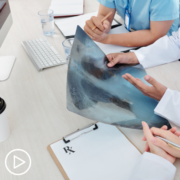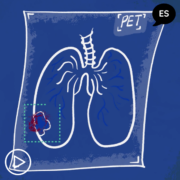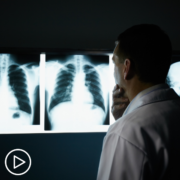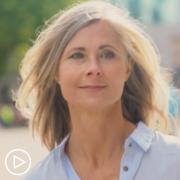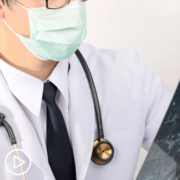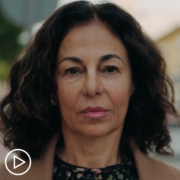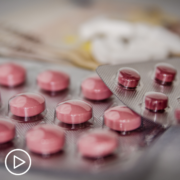Lung Cancer: Gina’s Clinical Trial Profile from Patient Empowerment Network on Vimeo.
Lung cancer survivor Gina was shocked after receiving her diagnosis at age 38. Watch as she shares her lung cancer journey including her diagnosis, treatment, clinical trial experience, and advice to other patients. In Gina’s words, “So what I’ve learned is that clinical trials are really the best and newest care for patients, and I feel like all patients should have access and have the experience of a clinical trial.”
Patient-to-Patient Diverse Lung Cancer Clinical Trial Profiles
Transcript:
Gina:
My lung cancer story is probably not that unique. There are actually a lot of people that are just like me. I was 38 years old, a nurse at the peak of my physical health, and I was actually training for a triathlon. And I just developed a cough, and no one would take me seriously. As a nurse, I felt like something was wrong because I was losing weight, and I wasn’t trying, and eventually I had to self-pay for a chest X-ray, and the chest X-ray showed that I had something going on in my left lung, but they weren’t really sure what it was. So, I took that chest X-ray to the emergency room for exactly what they tell you not to — a cough, and thankfully, the ER doctor took me very seriously and finally that led to a stage IV incurable, inoperable lung cancer diagnosis. As a nurse, I knew the severity of, of the diagnosis, and I knew that also there was a possibility for some new drugs, and so I’m so thankful that my doctor in Memphis knew to do biomarker testing, he found out that I was ALK-positive (anaplastic lymphoma kinase). My very first thing that had to happen was I had brain surgery.
And I feel like I’m a very lucky girl to have survived all that I have, and I watched the pain in my husband’s eyes as I rolled back from brain surgery and the f as I woke up from that brain surgery. And then the next thing was my left lung was removed, and I remember seeing my two boys and as I rolled back, how they were afraid for me to lose my lung, something that they felt like I needed. And so again, we experienced so much joy as I came back from that lung surgery and eventually recovered, and then I remember the first day that I actually was able to run a mile again, and that was so incredibly exciting for me. So now I was diagnosed in 2015, and now it’s 2021 and through the years, I went through each targeted therapy and cancer outsmarted it, and so the targeted therapy failed me eventually. And each one lasted about a year or so, and I think that through these years, I kept thinking that science would keep up with me, and I kept riding that wave of science and research, and I was so thankful. But we knew that it was incredibly important to continue to fund research for lung cancer, because when it comes to lung cancer, it seems like even though it’s the number one cancer killer of men and women and anyone with lungs can get it. The funding for it is so low because there’s still a thought process that smoking is the cause of lung cancer, and while we know that there’s a lot of people that are just like me who have absolutely no risk factors, we know that research is incredibly important for this disease. So, fundraising for lung cancer research and through our group, ALKpositive.org was incredibly important for me.
I just kept hoping that the next thing would happen, but I finally ran out of the last targeted therapy, and so that’s when I started looking for a clinical trial. And right now, it’s not that easy to find a clinical trial. Within our group, we have some amazing volunteers and members who really work to put the clinical trials out there for ALK-positive patients and to make sure that we know that we’re aware of them. And so anyway, I had a great friend who helped me look through the clinical trials, and eventually I found the perfect clinical trial for me. But it required me to travel to Boston, Boston quite a bit, and so that was really difficult raising two young boys and having my husband, who is also working, not be available. It was just really not fitting with our family to be able to travel and be away from my family so much, so I kept looking for clinical trials, and I finally found one that was about 200 miles away. And it still requires me to leave my family about every two weeks or so, sometimes just for a blood draw, but I’m so incredibly encouraged, because we found out that the clinical trial of this combination drug is working, and we found that cancer though it had kind of spread everywhere in my body, in my brain and in my pancreas, and even around my pulmonary artery, all of the cancer had decreased by about 50 percent. So, I’m incredibly encouraged, and that’s where we are now in the journey, and we’re just going to hope that the clinical trial keeps working and that new options are coming down the pipeline for other lung cancer patients.
A clinical trial is something that has, my perception has completely changed about. I thought when I was first diagnosed, a clinical trial was kind of like being a guinea pig, and now I think that it’s more like being a pampered poodle. So, what I’ve learned is that clinical trials are really the best and newest care for patients, and I feel like all patients should have access and have the experience of a clinical trial. We know that sometimes clinical trials don’t always pan out to have the best thing, but I see over and over again that clinical trials for patients have a lot of science behind them, and it’s an opportunity for patients to try the latest and greatest.
If you’re considering a clinical trial as an option, the most important thing is for you to become informed, really make sure you understand some clinical trial, really understand what the expectations are of you, and make sure that you’re willing to do what’s required of the clinical trial, make sure, that also that it’s conducive to your lifestyle and to your family. I think those are the things that are the most important. A clinical trial is an opportunity for the latest and greatest, but you also have to make sure that you understand what’s required and make sure that you are okay with the requirements of the trial.
If I were to tell you how I’m feeling today, I would tell you that I’m feeling encouraged that I have so much hope for the future. Being a part of a clinical trial has…honestly, if I’m very, very truthful, it was scary at first. In fact, I even cried when I signed the clinical…the clinical trial consents. It was completely scary, but now that I’ve been into the clinical trial now about nine weeks, my last scans were really good and really promising, and so for me, I feel very, very hopeful for the future, and I’m hoping that this is a drug combination that can be brought to other patients and that they can all benefit from this clinical trial and from my experience.

